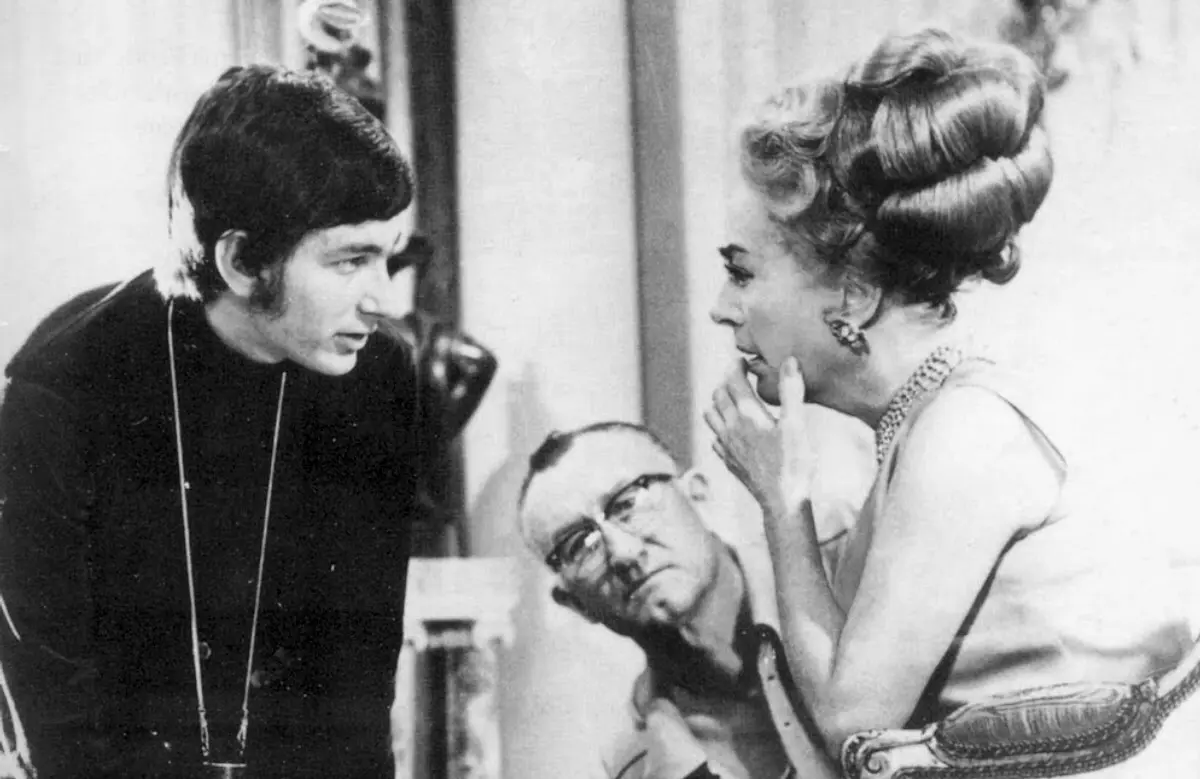How Steven Spielberg Got His Start on Television
-
 Steven Spielberg directing Joan Crawford in a segment for the 1969 pilot episode of Night Gallery. (Photo: NBC)
Steven Spielberg directing Joan Crawford in a segment for the 1969 pilot episode of Night Gallery. (Photo: NBC)When you think Steven Spielberg, you don't necessarily think of his TV work. The three-time Oscar winner has directed some of the biggest films of the last fifty years, but he actually got his start directing a handful of TV episodes in the late 60s and early 70s.
The story goes like this: While he initially started out as an unpaid intern in the editing department at Universal Studios, Spielberg eventually impressed the studio’s then-Vice President, Sidney Sheinberg, with his short film Amblin’. In fact, Sheinberg was so impressed by Spielberg’s work that he offered him a seven-year directing contract, making him the youngest director in history to sign that kind of a deal with one of the major Hollywood studios.
In 1969, Spielberg was hired to direct one part of the pilot episode for Rod Serling’s Night Gallery. He directed the episode’s “Eyes” segment, which starred Joan Crawford as a rich blind woman who gets a new pair of eyes that allow her to see, ironically, at the same moment as a New York blackout. It was his first assignment for the studio, and unsurprisingly, it was a bit of a bumpy ride for the young filmmaker. Not only did Spielberg have to convince both Crawford and the show’s production crew that his young age wasn’t something to be concerned about, but he also had to learn to filter some of his cinematic influences out of his TV work.
Inspired by the creative camera work of the European New Wave films, Spielberg took an experimental approach to his Night Gallery segment, which gave it a much different look and feel than typical TV shows of the time. As a result, one of the show’s producers was brought in to recut the segment, and Spielberg quickly adopted a more subdued style in his subsequent TV work.
Spielberg went on to direct a total of seven other TV episodes over the next two years, including a 1970 episode of Marcus Welby, M.D., a 74-minute-long episode of The Name of the Game, two episodes of the short-lived TV drama, The Psychiatrist, a segment in another episode of Night Gallery, and one episode of Owen Marshall, Counselor at Law.
During that time, he was also hired to direct an episode of Columbo. The episode, entitled “Murder by the Book,” was the first series installment of the detective drama, following a pair of made-for-TV films. And while the episode still has the feel of a traditional 1970s TV show, watching it today, it's directed in the same assured, unobtrusive style that Spielberg would later become known for in his films.
He followed Columbo up with a trio of made-for-TV films for Universal -- Duel (which later received a theatrical release), Something Evil, and Savage -- before making the transition into theatrical filmmaking, culminating with the release of Jaws in 1975.
He wouldn’t direct another episode of TV until the original Amazing Stories debuted on NBC in 1985. He directed two episodes for the short-lived series before it was cancelled in 1987.
Though he's had perhaps the most successful film directing career of all time, Spielberg has continued to dabble in television, producing dozens of TV shows over the years, including Band of Brothers, Falling Skies, United States of Tara, The Pacific, Pinky and the Brain, Animaniacs, and many, many more. This week the director comes (almost) full circle with a revival of one of his own past creations, Amazing Stories. If it's a hit this time, perhaps he'll return to direct another episode. Fingers crossed.
The first five episodes of the Amazing Stories revival are now streaming on Apple TV+.
Alex Welch has written about television and film for TV by the Numbers, IGN, The Berrics, Paste Magazine, Screen Rant and GeekNation. Follow him on Twitter @alexrwelch.
TOPICS: Amazing Stories, Apple TV+, Columbo, Marcus Welby, M.D., Night Gallery, Steven Spielberg
- Once Dead, TV Anthologies Are Enjoying a New Golden Age
- Apple TV+'s biggest flaw was pursuing big names: Amazing Stories is emblematic of its bland to expendable lineup
- TV anthology series have become lame, lazy and lifeless: Why have they lost their way?
- Amazing Stories shows the flaws with episodic anthology series